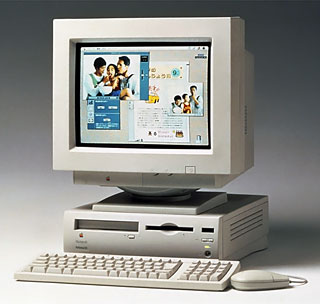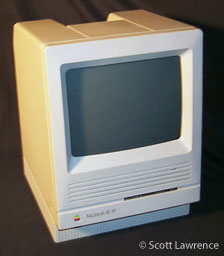On Low End Mac, we are interested in value computing – getting the most for your money. Usually we look at ways to do cool things with inexpensive Macs, like using a Quadra as an MP3 server. But when is the right time to forsake the low end? Is there a point where the time we spend putzing around with old Macs isn’t worth the effort?
![]()
No More 68k Macs for Me
 Last week I decided to stop working on 68k Macs. I was playing around with my Quadra 630 and having software troubles with the hard drive. The Quadra refused to boot off a CD. Well, we are seven years after the switch to PowerPC chips. Heck, we are even five years after the switch to PCI-based Macs.
Last week I decided to stop working on 68k Macs. I was playing around with my Quadra 630 and having software troubles with the hard drive. The Quadra refused to boot off a CD. Well, we are seven years after the switch to PowerPC chips. Heck, we are even five years after the switch to PCI-based Macs.
On eBay you can get a complete Power Mac 7200 for $30. Or, if you want to do audio/visual work, you can find a Power Mac 7500 for $50. At those prices, it’s hard to justify troubleshooting a Quadra. Even when I get it running, I am unlikely to really use it if I have a Power Mac nearby. At best, a 68k Mac is a backup computer in case my main computer breaks.
I’m not saying a Quadra isn’t a great computer. Mine is fabulous. I found a motherboard that has two SIMM slots, so I could max out the memory at 56 MB. And I put a full 68040 CPU in it, so that it has an FPU – not that I ever noticed the difference. Because the Quadra has IDE and an ethernet card, it served MP3s to my network for half-a-year from a 60 GB hard drive. It runs Mac OS 8.1 and ClarisWorks and can do some Internet work, if you are very patient.
The Future Is PowerPC
But the Quadra will never do certain things. It will never play MP3s. It will never run great PPC-only utilities like FinderPop. It will never run Mac OS 8.5, let alone Mac OS X. Although running FinderPop may seem like a detail, it is not. With the best utilities, I learn to rework my computer habits.
With FinderPop, for example, I have all my application launching and switching and window-switching all hidden in the unused part of my menu bar. It takes up no screen space, and I use it dozens of times a day. Going back to a 68k Mac means that I have to laboriously navigate through the Finder if I want to launch another application. Sure, I could set up a bunch of aliases to make things quicker, but the work isn’t worth it for a machine I use irregularly.
Over the years, Mac users have had to fight against the “one platform standardization” argument. It’s usually heard from a Windows user. You already know it, it goes like this: “Our organization would save time/money/resources if we didn’t have to support two platforms. If we standardize on Windows and get rid of the Macs, things will be better.” The argument is not persuasive for Mac users, because we can’t imagine that things will be better if we go with the worse of two platforms. Choosing the lowest common denominator is not the pathway to bliss.
But what about comparing PPC Macs and 68k Macs? Would life be better if we standardized on PPCs? As much as I love my Mac IIsi and Quadra 630, I would rather have a Power Mac 8600 any day of the week. When all my Macs have a PowerPC processor, it means that I can begin to rely on things that don’t work on 68k Macs. It’s easier for me to set up a new Mac if I don’t have to try to remember what does and doesn’t work on the 68k.
As Dan Knight has noted before, the low end is a shifting target. Older Power Macs are now at the ridiculously low priced low-end today. In my mind, it becomes ridiculous when the shipping costs more than the computer, and that’s true of most 68k Macs. Several Power Macs are ridiculously low-priced, too. If you really want a 6100 or a 7200/75, you just need to ask the right person. You can probably find one for free just for clearing out the space for someone.
Maybe we’ve gotten to the point where we should abandon 68k Macs?
 When I say abandon 68k Macs, I imagine marooning them on a desert island. I don’t think we should kill them all off immediately. There are many SE/30s with ethernet cards that are happily acting as file servers or Web servers. If they are useful, let them keep on working. But once they they can’t make it on their own, I refuse to give them any more help.
When I say abandon 68k Macs, I imagine marooning them on a desert island. I don’t think we should kill them all off immediately. There are many SE/30s with ethernet cards that are happily acting as file servers or Web servers. If they are useful, let them keep on working. But once they they can’t make it on their own, I refuse to give them any more help.
The argument for abandonment is a slippery slope. Today it is 68k Macs. Maybe tomorrow it might be the the Classic Mac OS. Where do we draw the line?
Even though I’m not using Mac OS X, I’m looking forward to the day where we can abandon the Classic Mac OS.
Keywords: #68kmacs #powerpcmacs
Short link: http://goo.gl/DEpckH
searchword: abandonlowend

